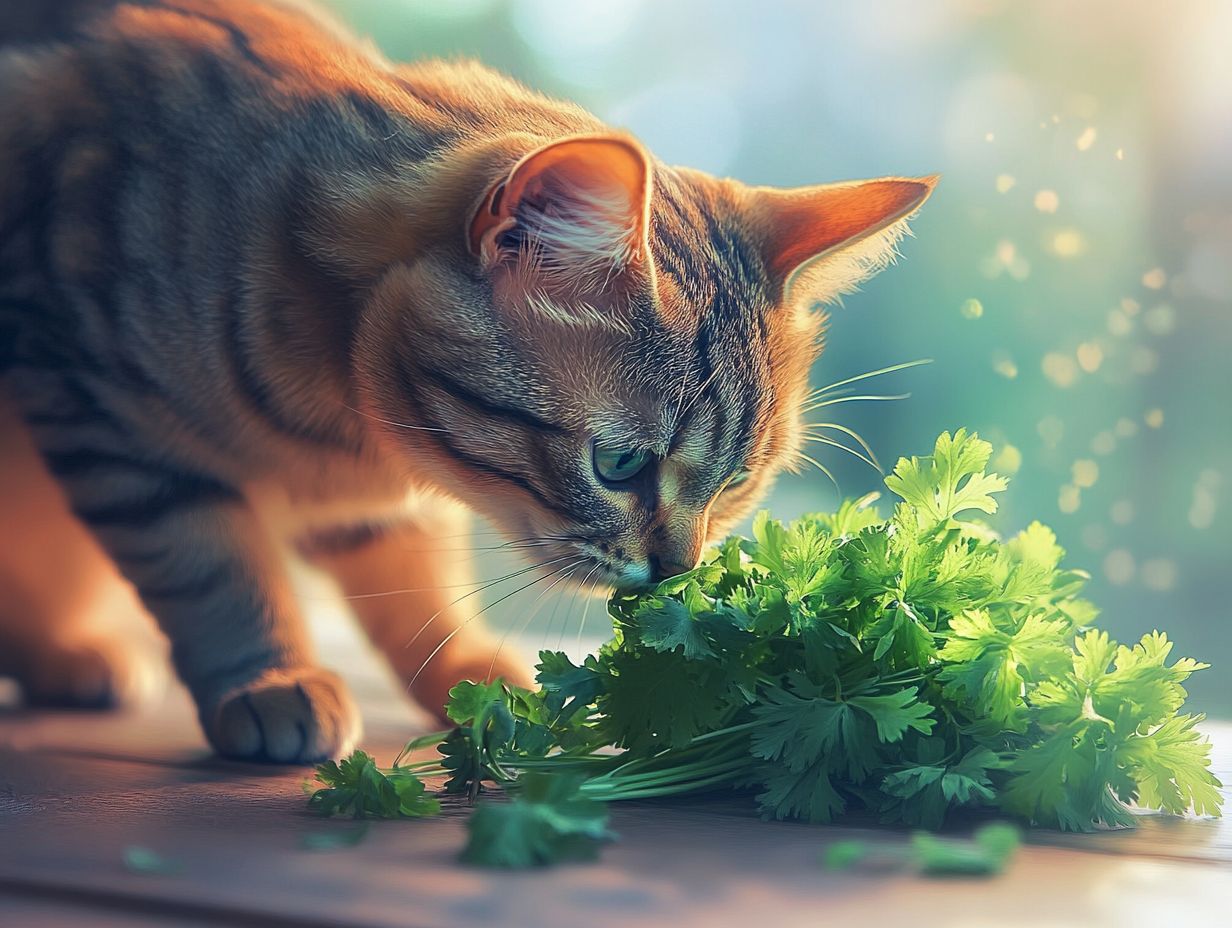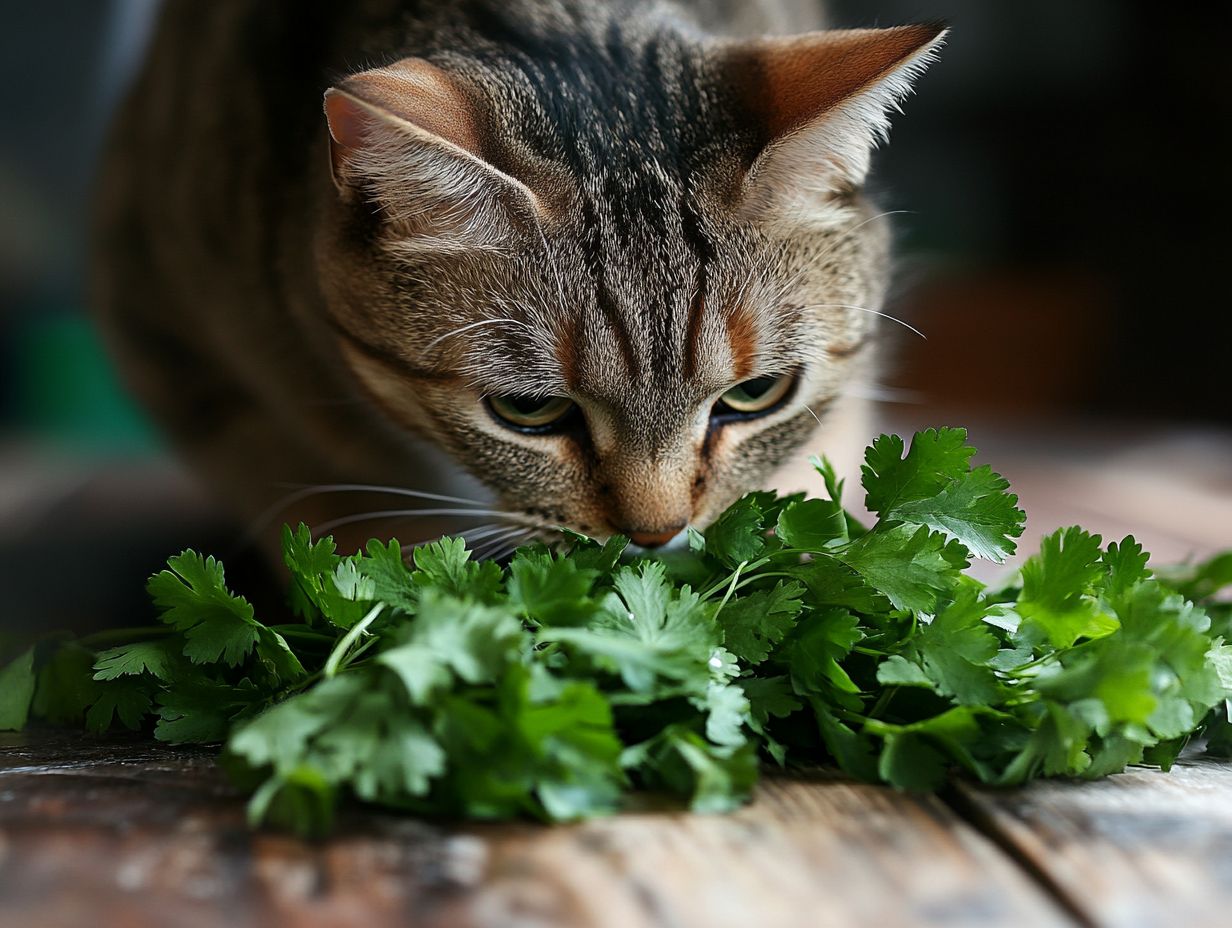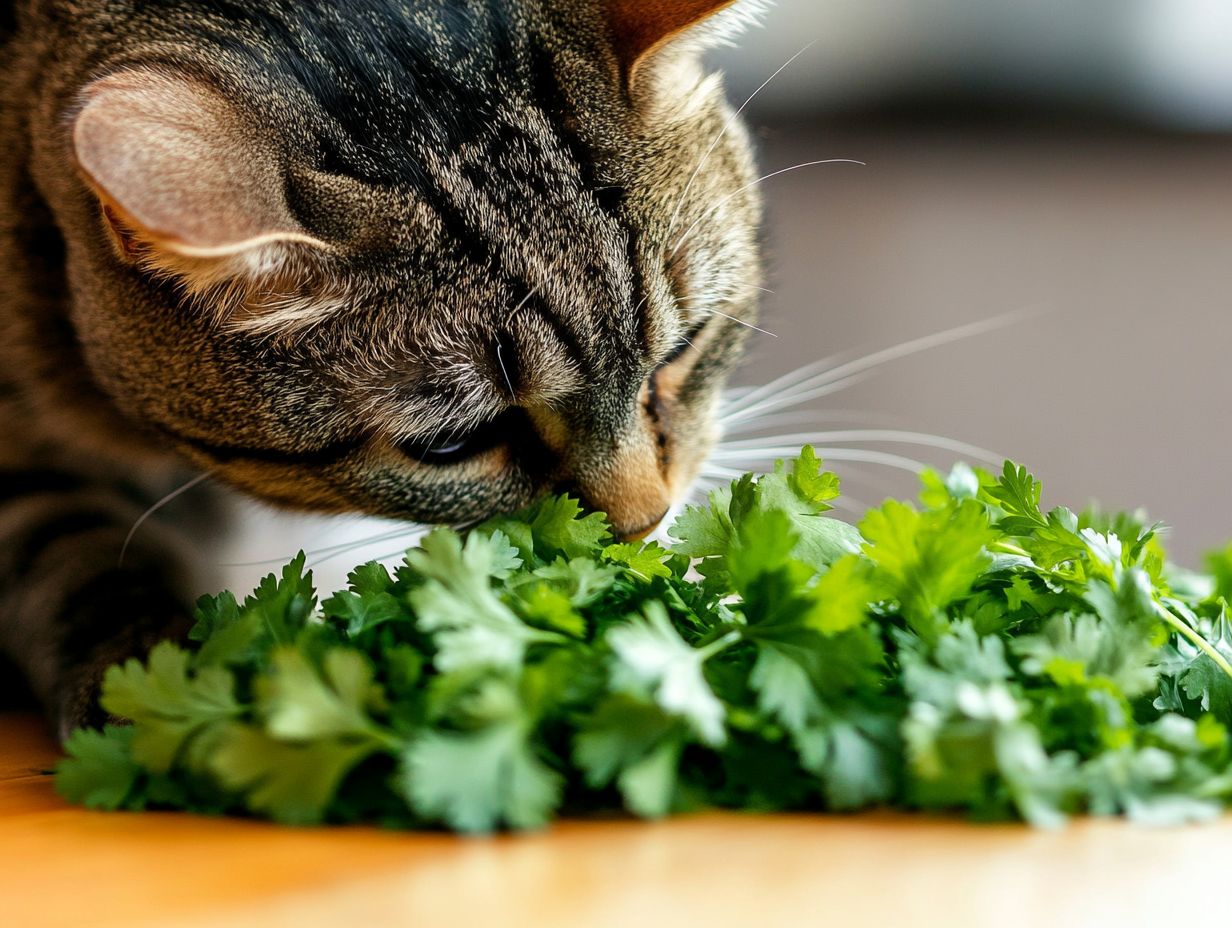Coriander can be safely consumed by some cats in moderation. This article explores its nutritional benefits and potential risks, helping you make informed choices for your feline friend.
The question of whether cats can eat coriander has sparked much debate among pet owners, veterinarians, and herb lovers. While coriander is a culinary herb known for its several health benefits for humans, its effects on cats remain uncertain.
Some pet owners believe it can enhance their cats’ health, while others caution that it may pose risks. This article will explore the nutritional properties of coriander and discuss its place within the broader category of safe herbs for cats.
Different Opinions and Perspectives
Opinions on the safety of coriander for cats vary widely. Some pet owners share anecdotal evidence highlighting the positive effects of coriander on their cats’ digestion and appetite. Conversely, others report negative experiences, noting that some cats may be sensitive to or dislike strong-smelling herbs.
Veterinarians generally maintain that most herbs are not toxic to cats, though they should be offered in moderation. The effects of herbs can differ from one individual cat to another. Some holistic veterinarians recommend coriander as a beneficial source of beta-carotene (which helps with vision and immune health) and a potential aid for minor digestive issues.
However, other veterinarians caution against giving coriander to cats, emphasizing that not all herbs are safe. This caution is supported by research indicating potential risks associated with several common herbs, including mint, basil, and parsley.
Nutritional Value of Coriander for Cats
Understanding the nutritional value of coriander for cats is crucial for pet owners considering adding this herb to their diets. Coriander is rich in essential vitamins and minerals that may provide various benefits for overall health.
This herb is known for its potential medicinal properties, making it a popular subject among those studying herbal medicine and nutrition. However, it is essential to evaluate whether the benefits of coriander outweigh any potential risks associated with its consumption by cats.
Vitamins and Minerals in Coriander

Coriander is a nutrient-rich herb that contains various vitamins and minerals beneficial for cats, including vitamins A, C, and K, as well as essential minerals like calcium and iron. These nutrients play crucial roles in maintaining a cat’s overall health.
Vitamin A supports vision and immune system function, while vitamin C acts as a powerful antioxidant, helping to reduce inflammation and promote healing. Vitamin K is essential for proper blood clotting. The calcium found in coriander is important for maintaining strong bones and teeth, while iron is significant for the production of hemoglobin, which transports oxygen in the blood.
It is important to note that while coriander can offer these benefits, it should be given in moderation to avoid digestive upset, as cats may be sensitive to certain herbs.
Potential Health Benefits of Coriander for Cats
- Offer no more than a teaspoon of fresh coriander per week.
- Introduce it gradually by mixing it with wet food or offering it fresh to monitor for any adverse reactions.
Risks of Feeding Coriander to Cats
While coriander has potential benefits, it may also pose risks such as allergies or sensitivities. If a cat exhibits unusual behavior after consuming coriander, owners should consult a veterinarian.
Symptoms of Allergic Reactions
Some potential symptoms of allergic reactions to coriander include itching, gastrointestinal upset, nausea, vomiting, and diarrhea. If you notice any of these signs, discontinue use and consult your veterinarian.
Conclusion
In summary, coriander can be a beneficial addition to a cat’s diet when given in moderation. However, it’s crucial to monitor your cat for any adverse reactions and consult a veterinarian when introducing new foods. Always consult trusted veterinary sources like the ASPCA or veterinary journals to verify the safety and nutritional benefits of coriander for cats.
Benefits of Coriander for Cats
Anti-inflammatory and Digestive Benefits
Coriander’s anti-inflammatory properties may offer relief for cats experiencing various ailments, while its potential digestive benefits can promote better gut health. Rich in antioxidants, coriander is recognized for its ability to help reduce inflammation, making it particularly beneficial for cats with conditions such as arthritis or skin irritations.
Many experts emphasize coriander’s effectiveness in aiding digestion, as its aromatic properties can stimulate appetite and alleviate gas, bloating, and other digestive discomforts that cats may encounter. Incorporating coriander into a cat’s diet, in moderation and under a veterinarian’s guidance, could potentially enhance their overall health and vitality.
Risks of Feeding Coriander to Cats
Pet owners should carefully consider the risks of feeding coriander to cats, including potential toxicity and allergy issues, before deciding to incorporate this herb into their diets.
Toxicity and Allergy Concerns

The potential toxic effects of coriander on cats may include allergic reactions in those with an atypical sensitivity to this herb. While coriander is not frequently used with cats, it is generally considered safe. However, it is crucial to understand that this does not rule out the possibility of severe toxicity. Some cats may experience allergic reactions, which can manifest as itching, gastrointestinal upset, or even anaphylaxis.
Additionally, adverse reactions may include nausea, vomiting, or diarrhea in cats that have an intolerance to this herb. If you notice vomiting, diarrhea, or signs of an allergic reaction, discontinue use and consult your veterinarian immediately. To learn more about whether cats can safely consume coriander, check out this article on Can Cats Eat Coriander? Safe or Toxic?.
Cat owners should exercise caution when introducing any new food or herb to their pets, as the potential for adverse reactions can vary significantly. It is always advisable to consult a veterinarian before adding unfamiliar ingredients or products to your pet’s diet.
How to Safely Incorporate Coriander into a Cat’s Diet
The appropriate way to feed coriander to cats is to adhere to guidelines and precautions, ensuring it is given only as directed and under the advice of a veterinarian.
Recommended Portions and Precautions
When deciding how much coriander to give a cat, it is essential to start with a small amount, such as 1/4 teaspoon of finely chopped coriander per meal, and monitor for any negative reactions, always prioritizing safety and consulting with a veterinarian. This cautious approach helps determine if your cat has any adverse reactions to this herb, which, while safe in low amounts, can cause gastrointestinal upset or other issues in larger quantities.
Veterinarians recommend introducing new foods gradually, allowing the cat’s digestive system time to adjust. Observing any changes in behavior or health after introducing coriander will provide valuable information. Following proper guidelines and heeding the advice of professionals helps prevent negative health impacts and enables owners to make informed choices about their pets’ diets. For more information, check out Can Cats Eat Coriander? Safe or Toxic?.
Frequently Asked Questions
Can cats eat coriander?

Yes, cats can eat coriander in small amounts. However, it is not recommended as a regular part of their diet.
Is coriander safe for cats to eat?
While coriander may offer some health benefits for cats, it’s crucial to approach its use cautiously and always seek professional advice.
Benefits of Coriander
Coriander may offer some health benefits for cats, including potential digestive support. Always verify these claims with reputable veterinary sources like the ASPCA or the Pet Poison Helpline to ensure factual accuracy.
Potential Risks
If cats consume too much coriander, it can cause gastrointestinal upset and potentially lead to vomiting or diarrhea. It can also interfere with the absorption of certain medications. Therefore, it’s essential to introduce any new food gradually.
Feeding Guidelines
Coriander is not recommended as a regular part of a cat’s diet and should only be given in small amounts. A good starting point is offering 1 teaspoon of finely chopped leaves once a week. Cats can eat coriander leaves that are finely chopped or blended into their food. The seeds should be crushed or ground before feeding to cats.
Can Coriander Be Toxic to Cats?
No, coriander is not considered toxic to cats. However, as previously mentioned, it should only be given in small amounts and not as a staple in their diet.
What Are Some Alternative Herbs for Cats to Eat?
Safe and beneficial herbs for cats include catnip, rosemary, thyme, and parsley. However, it is crucial to always consult with a veterinarian before introducing new foods into a cat’s diet, as each cat’s health and dietary needs are unique. Be cautious with herbs toxic to cats, such as garlic and chives, which can cause stomach issues, lethargy, and even poisoning. Symptoms may include vomiting, diarrhea, and abdominal pain. Growing an indoor herb garden can be a great way to manage herb usage safely in your kitchen. Ensure herbs are kept out of reach of your cat to prevent accidental ingestion of harmful plants.
Always prioritize your cat’s health by consulting a veterinarian when adding new foods to their diet. Moderation is essential when offering any new herbs.